- Home
- Peter Ackroyd
The Lambs of London Page 5
The Lambs of London Read online
Page 5
WILLIAM HAD BEEN WALKING , some months before, by the bank of the Thames just down from the Strand; it was high tide, at three o’clock in the morning. He often came at this time to savour the sound and the flow of the rising water. It gave him hope. He had seen a man standing by the edge, taking off his boots and trousers. There could be no doubt about his intention. “Stop a minute.” William, acting on instinct, rushed over to him. “Wait!”
He was young, no older than William himself. He was trembling with the cold. He muttered something William could scarcely hear; it seemed to be a passage from the New Testament, but William could not be sure. William took the young man’s arm, but was shaken off. “Take a look at my face,” the man said. “You will never see this face again.” Then he seemed to hop backwards. He fell into the water and floated for a moment; as he floated, he smiled at William. Then he was gone. The strong tidal current of the Thames, below the quiet surface, sucked him down. It was so sudden, and so effortless, that William felt a curious desire to follow him.
HE COULD STILL RECALL the sensation, as he sat with Charles and Mary Lamb in Laystall Street.
“I have prolonged my welcome,” he said, rising to his feet. “My father will be expecting me.”
“But you will come again?” She turned to her brother. “Mr. Ireland has promised to show me more Shakespeare. The genuine hand.”
William left quietly, so as not to wake their father, and stood with Charles on the doorstep.
“Who was it who squared you? A pad?”
“I never saw him.” Charles held on to the door, as if he were now very tired.
“You had been drinking?”
“I am afraid so.”
“You must take care, Mr. Lamb.” He was aware that he was taking Mary’s part. “The streets are never safe at night.”
“Whenever I think of the night, Mr. Ireland, I think of cats in courtyards.”
chapter four
THREE WEEKS AFTER the events of that night, Mary Lamb decided to venture into Holborn Passage. Ever since their encounter she had often pictured to herself William Ireland among his books, and in her imagination he had already become a figure of some interest. Charles’s friends were altogether too loud; they were too talkative. William was more sensitive. He had greater refinement of spirit, or so she supposed. She began to breathe more rapidly as she approached the bookshop and read the sign—“Samuel Ireland, Bookseller”—hanging above the door. She passed the bay window and had decided quickly to walk on when a loud laugh, like a bellow, came from within. She paused and turned, to see an elderly man clapping William on the back while another man looked on. William glanced up at her, as if he had been awaiting her arrival, and then hurried to the door. “Miss Lamb, will you come in? You have caught us in a white minute.” She was drawn into the shop almost against her will; she disliked meeting strangers. She recognised Samuel Ireland from the resemblance to his son but, in a hot flurry of embarrassment, she found herself shaking hands with the elderly gentleman who still had the remnants of his laugh upon his face.
Samuel Ireland was already talking to her. “Honoured to make your acquaintance, Miss Lamb. Mr. Malone has introduced himself, I see. You know of his scholarship, no doubt. What we have found, Miss Lamb, is a jewel.”
“More precious than any jewel, Father.”
“Do you see this?” Samuel Ireland held up a disc of red wax, slightly discoloured around its edge. “It is his seal.”
“It is his device,” the old man said.
“So you have explained, Mr. Malone.” Samuel Ireland was still smiling at Mary, but she did not care for his triumphal air. “It bears repetition, sir, if you would be kind enough.”
He held out the seal for Mary’s inspection, and Malone leaned over her to point out its details. She could smell the sourness of his old breath. “This is the quintain.” Mary could see a pole, with a sack on one end, suspended across a bar. “It is an instrument of jousting which turned and turned about. The rider would gallop towards it. He would strike it with his javelin or it would hit him. Do you understand the significance? I did not catch your name. ‘Shake’ ‘spear’ at it. And look there. There are the initials.” Mary could make out an indistinct “W” and “S” at the base of the seal. Now she understood their high spirits.
“He would have used it for correspondence,” William said. “For theatre documents. Mr. Malone has been kind enough to identify it for us. He has published a concordance of the plays.”
Malone was wearing a waistcoat of bright green silk, from which he took out a small bound paper notebook, and turned towards William’s father. “We need more than the object itself. We need the fons et origo, Mr. Ireland.”
“Sir?”
“The provenance. The origin.”
Samuel Ireland looked at his son who, as Mary observed, quickly shook his head. “We are not at liberty, Mr. Malone—”
“A client?”
“I cannot say.”
“Well, I am sorry for it. The source of these treasures should be known.”
Samuel Ireland, apparently ignoring Malone’s remark, took Mary’s arm. “Have you seen the deed, Miss Lamb?”
“The deed?”
“I have merely mentioned it to her, Father.”
“Oh this will never do. Miss Lamb really must see the deed. William tells me that you are a lover of all things Shakespearian.”
“Indeed. Yes, I am.”
“And here it is.” Mary was startled to discover that William’s father had the faintest air of a cheap-jack. It was not how she had imagined his family. “This is the thing, Miss Lamb.” He laid out a piece of vellum, and gently touched it with his forefinger. “Very choice.”
“I have examined it carefully,” Malone told her. His mouth was once more perilously close. “It is the exact handwriting. There can be no doubt about it.”
“I am very pleased,” was all she could think of saying.
William noticed her embarrassment. “May I walk a little way with you, Miss Lamb?”
“Oh yes. Of course.”
After hurried farewells he took her out into the welcome chill of Holborn Passage.
“I am sorry to have disturbed you,” he said. “They are enthusiasts.”
“Do not apologise, Mr. Ireland. There is nothing wrong with enthusiasm. I merely felt the want of air.”
They walked in silence past an artificial-flower maker, whose stall always stood at the corner of Holborn Passage and King Street.
“I have a confession to make to you, Miss Lamb.”
“To me?”
“I told you that the deed came from a curiosity shop in Grosvenor Square. It did not. It came from the person who gave me the seal.”
“I don’t see—”
“—what it has to do with you? Of course it has nothing to do with you. I will say no more about it.”
“No. I mean, why this person should have imparted such precious gifts.”
“Can I tell you a story, Miss Lamb? A month ago I was sitting in the coffee shop on Maiden Lane. Do you know the one? It has a very fine counter of French mahogany. I had taken with me an old black-print edition of Chaucer’s Canterbury Tales which I had just purchased from a customer in Long Acre, and I was turning its pages when I heard a voice distinctly addressing me. ‘Do you know the virtues of books, sir?’
“It was a woman of middle age, sitting at a table behind me. She was dressed entirely in black with a black bonnet, a black shawl and a black umbrella. It is not usual for a woman to be sitting alone in a coffee shop, not even on Maiden Lane, and of course I was a little perturbed. She was clearly not a lady of the town. Excuse my indelicacy, Miss Lamb. Her age and appearance rendered that out of the question. And I surmised that she was either drunk or out of her wits. ‘Virtues, madam?’
“‘Do you understand these things? Papers and books and suchlike?’
“‘It is my profession.’
“‘I do not trust the lawyers.’ I noticed
that she was drinking a cup of sassafras, a concoction I heartily detest. ‘As you can see, I am a widow.’
“‘I am sorry.’
“‘There is nothing to be sorry for. He was a brute. But he has left me many papers.’ Naturally I became interested. ‘I have no mind for papers. I need a mind.’ It occurred to me again that she might be one of those deluded women who are often to be found on the streets of London. But there was a carefulness, and steadiness, about her that suggested otherwise. ‘You may think it odd, sir, that I should address you in this way. But, as I said, I have an aversion to attorneys and law-beagles and suchlike. For the last several weeks I have said to myself—if I chance upon a person who has skills in studying and deciphering, then I will pounce upon that person.’ I could not help but smile at this. ‘You see, sir, that I am not used to flowery speech. Will you tell me your name?’ She opened her purse of black silk, and I distinctly scented violets. It is a lovely perfume, don’t you think? ‘I have no card. I have only my husband’s. But the address is the same.’ I noted that her husband, Valentine Strafford, had been an importer of tea and that he had lived at a good address—Great Titchfield Street, in the parish of Marylebone. So I gave her my name, and promised to call upon her. It is what politeness required.
“Quite by chance I passed the house three days later on my way to a book-binder in Clipstone Street. Do you know the neighbourhood, Miss Lamb? It is not antique, but it is interesting. I had as yet no real intention of visiting her, but I must admit that I had been a good deal intrigued by her. I glanced into the ground-floor window and, on a long table, what did I see but heaps of papers and rolls of manuscripts! There were files and boxes on the table, also, together with other documents that had been tied with string or tape. So she had been speaking no less than the truth about her husband’s papers. I did not hesitate, but on an instinct climbed the steps and rang the bell; to my surprise, she answered the door herself. ‘I hoped that you would come, Mr. Ireland. I have been waiting for you.’
“She took me into the ground-floor room that had the papers. I could see a long and narrow garden at the back, where there was one of those follies in the form of a rock-pool. They have become quite a fashion. ‘I am not sure, Mrs. Strafford, if I will be able to help you.’
“‘Nonsense. I saw your eyes widen when you came into the room. You love such things.’ She offered me sassafras, but I declined. She obviously did not care for her husband’s tea. ‘Of course you will be remunerated.’
“‘Before we speak of payment, let me browse for a while.’
“‘They may signify nothing.’
“‘They may signify a great deal. Let me examine them first.’
“And so I set to work. It was an interesting collection. There were records of payments from Bermondsey Abbey, dating from the thirteenth century, and portions of a sixteenth-century rent-roll from the parish of Morebath in Devon. I hope I am not boring you. There was a map of the shoreline from Gravesend to Cliffe; the date was uncertain but, judging from the calligraphy, I guessed it to come from the middle of the seventeenth century. Of course I could not determine how any of these items had come into her husband’s possession. I found a long inventory of goods signed by the Comptroller of the Excise at the London Customs House, dated in the thirteenth year of the reign of Richard II, as well as several pages of heraldic mottoes and devices. It seemed to me to be a random collection, but such a curious one that I felt a certain excitement. It appealed to my sense of adventure.
“Then I came across a deed, recently notarised and sealed with the distinctive green wax from the office of the sheriff of London. My father has pointed it out to me on several occasions. But this was no antiquity. It concerned a property in Knightrider Street, and it was clear from the document that Strafford had purchased a dwelling for £235 only two years before. I walked into the hallway and called out for Mrs. Strafford, who came down at once from the first floor.
“‘You have found something, Mr. Ireland?’
“‘I believe I have, Mrs. Strafford. Let me show you this document. Have you seen it before?’
“‘No. I have not.’
“‘Then you have a new house.’
“‘My husband never mentioned this. Whatever was he thinking? Knightrider Street? That is by St. Paul’s, is it not? Not a cheap property, I am sure.’ She looked up at me, but I know nothing about such matters. ‘We must see it at once.’
“We hailed a closed chaise. I prefer a cabriolet. These chaises smell of stale straw and damp umbrellas, don’t you think? But there was nothing else to be had. We were stopped briefly in Holborn, where a young boy had been mangled by some horses, and then travelled eastward to Knightrider Street. Do you know that street, Miss Lamb? It curves like the side of a Roman amphitheatre. That is how it acquired its name.
“Mrs. Strafford jumped out of the cab before I had a chance to pay the fare, and in her eagerness she walked ahead and passed the right door. I called her back, and we stood together in the street. It was a dark afternoon, and there was a candle behind the window. That was rather a surprise. It would not have seemed marvellous to me that the supposedly dead Strafford was living here and, judging by the look of horror upon Mrs. Strafford’s face, the same thought had occurred to her. But I could see her mustering her courage, and she mounted the steps to the door. She rapped upon it, and for the first time I noticed that she was not wearing gloves. Odd, don’t you think? The candle was then removed by an unseen hand. We waited with growing impatience, until the door was opened by an old lady who seemed bowed by some frightful disease. ‘There is nobody at ’ome,’ she said.
“To my astonishment Mrs. Strafford walked past her and called out ‘Come down! Come down!’
“‘Mr. Strafford never comes no more.’
“‘I beg your pardon?’ Mrs. Strafford had been about to climb the staircase, but she turned back.
“‘He ain’t bin ’ere for eight months or more. I ain’t bin paid for two months neither.’
“‘You are the housekeeper, are you?’
“‘I was, but I ain’t bin paid.’
“‘We will attend to that.’ I could see that Mrs. Strafford was not a woman for delay. ‘How much did my husband owe you?’
“If she was at all surprised by the sudden appearance of Mrs. Strafford, she did not show it. ‘Sixty shillin’s. Seven and six per week.’
“‘You don’t mind paper money, I take it?’ She took three pound notes from her purse. ‘It is as good as metal.’
“There was some further conversation between them but I was curious to discover what, if anything, lay behind the doors of this old house. I love the evidence of the past, Miss Lamb. There was a back room, just beyond the staircase; as soon as I entered I sensed the faint odour of old papers, as refreshing to me as any herb or plant. What is the sweetness of flowers compared to the savour of dust and confinement? There was a large wooden bureau in a corner of the room; I opened it and discovered piles of documents folded, tied, or laid down in single sheets.
“Mrs. Strafford came up suddenly behind me. ‘What is this? More papers? Oh Lord, my husband was drowning in papers.’
“‘They may be all over this house. What can I do—’
“‘What can you do with them? You can keep them, Mr. Ireland. You found the house for me. You may have its papers.’
“I reflected for a moment, and found myself looking out through a grimy window at a small paved courtyard. ‘No. That is not just. Let us put it differently. If I find anything that is of value to me, but not to you, then I may keep it.’
“‘Agreed.’
“‘As easily as that?’
“‘It is easy to give away what I never possessed. Here are the housekeeper’s keys, Mr. Ireland. When you have finished your work, the house will be sold.’
“I came back to Knightrider Street on the following morning, with the excuse to my father that I was examining a gentleman’s library in Bow Lane. As I said to you, I wished
this to be my own adventure. I began at the top of the house, and inspected each room thoroughly. The house was for the most part bare of furniture, except for a small room that the ancient housekeeper had occupied, but there were several chests and cases in which I found more documents. It was clear to me now that Mr. Strafford had been an inveterate and eager collector of manuscripts; there were bills of mortality, actors’ parts written on long scrolls, diplomatic correspondence and even folio pages from an illuminated Bible. Do tell me if I am boring you, Miss Lamb. It was on the second morning, however, that I discovered the deed that contained the signature of William Shakespeare. The deed my father has just shown to you. I had not noticed the name at first, and had put the document to one side with some other deeds. Yet something must have caught my attention. It may have been no more than the proximity of the ‘W’ and the ‘Sh.’ I picked up the page again and, an hour later, I was conveying it back to the bookshop. It was the perfect gift for my father. But then, just yesterday, I also found the seal.”
“Does the woman know of the seal?” Mary had listened in profound silence to his story, but was now very curious.
“Mrs. Strafford? Oh yes. But she does not value it. She is not in the least interested in Shakespeare. She lacks our—enthusiasm.”
“Her husband did not.”
“I am not yet sure whether he collected these things out of deliberation, or whether he amassed material injudiciously. I still have to search many boxes and cases. I felt obliged to tell my father about Strafford’s papers, but I have given him no details. He would be indiscreet. I know him.”
“I envy you.”
“Whatever for, Miss Lamb?” No one had ever addressed him in that fashion.
“You have a quest. A purpose.”
“I would not put it as highly as that.”
“Oh, I would.”
“Then perhaps I can share this—this quest—with you.”
“In what way?”
“I can bring my discoveries to you. They will please my father, and they will also please you.”
“Would you do that?”

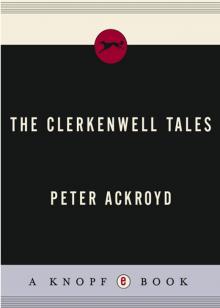 The Clerkenwell Tales
The Clerkenwell Tales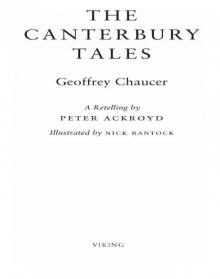 The Canterbury Tales
The Canterbury Tales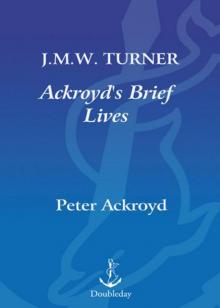 J. M. W. Turner
J. M. W. Turner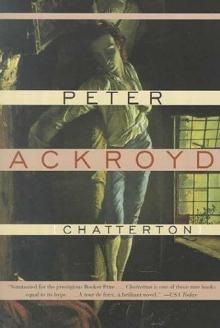 Chatterton
Chatterton The Canterbury Tales – A Retelling
The Canterbury Tales – A Retelling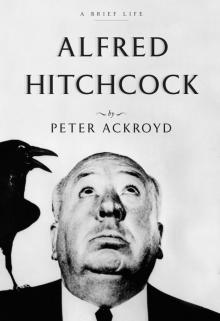 Alfred Hitchcock
Alfred Hitchcock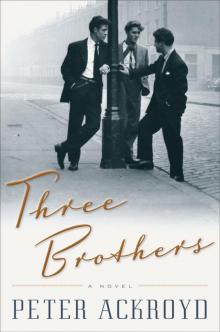 Three Brothers
Three Brothers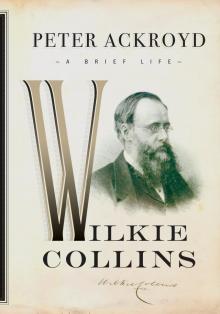 Wilkie Collins
Wilkie Collins Venice
Venice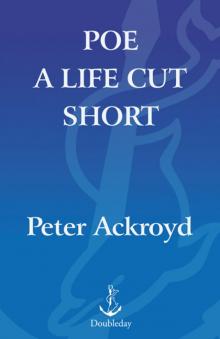 Poe
Poe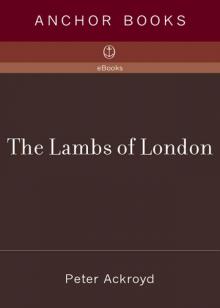 The Lambs of London
The Lambs of London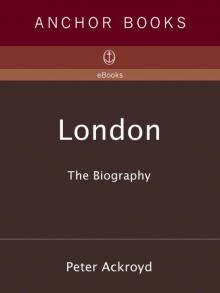 London
London Queer City
Queer City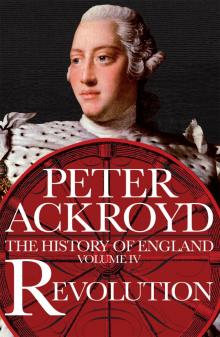 Revolution, a History of England, Volume 4
Revolution, a History of England, Volume 4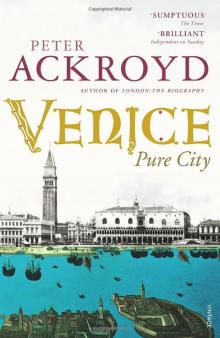 Venice: Pure City
Venice: Pure City Foundation
Foundation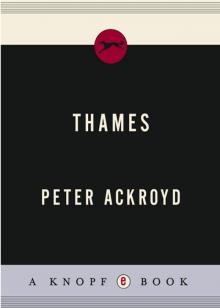 Thames
Thames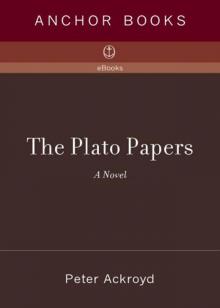 The Plato Papers
The Plato Papers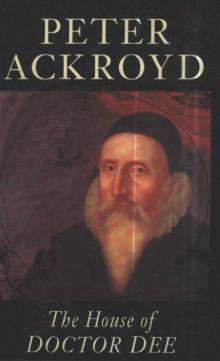 The house of Doctor Dee
The house of Doctor Dee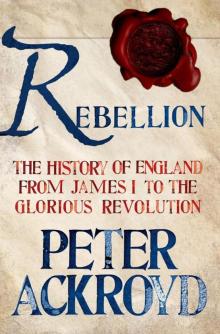 Rebellion: The History of England from James I to the Glorious Revolution
Rebellion: The History of England from James I to the Glorious Revolution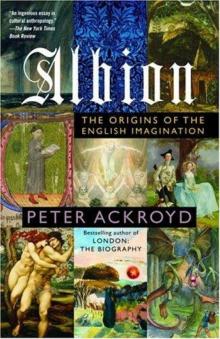 Albion: The Origins of the English Imagination
Albion: The Origins of the English Imagination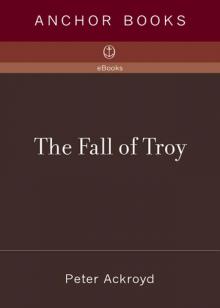 The Fall of Troy
The Fall of Troy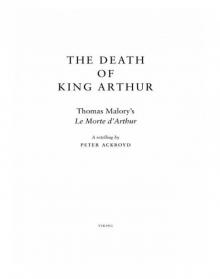 The Death of King Arthur
The Death of King Arthur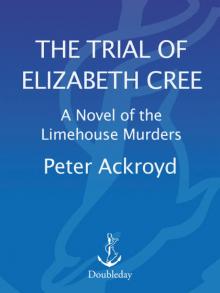 The Trial of Elizabeth Cree
The Trial of Elizabeth Cree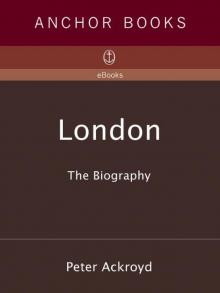 London: The Biography
London: The Biography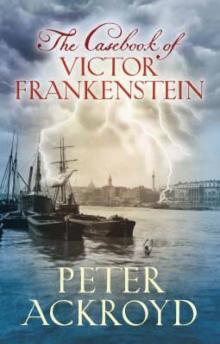 The Casebook of Victor Frankenstein
The Casebook of Victor Frankenstein Hawksmoor
Hawksmoor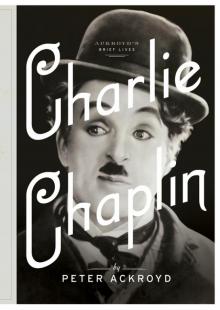 Charlie Chaplin
Charlie Chaplin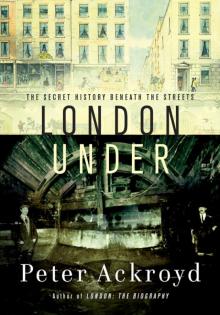 London Under
London Under